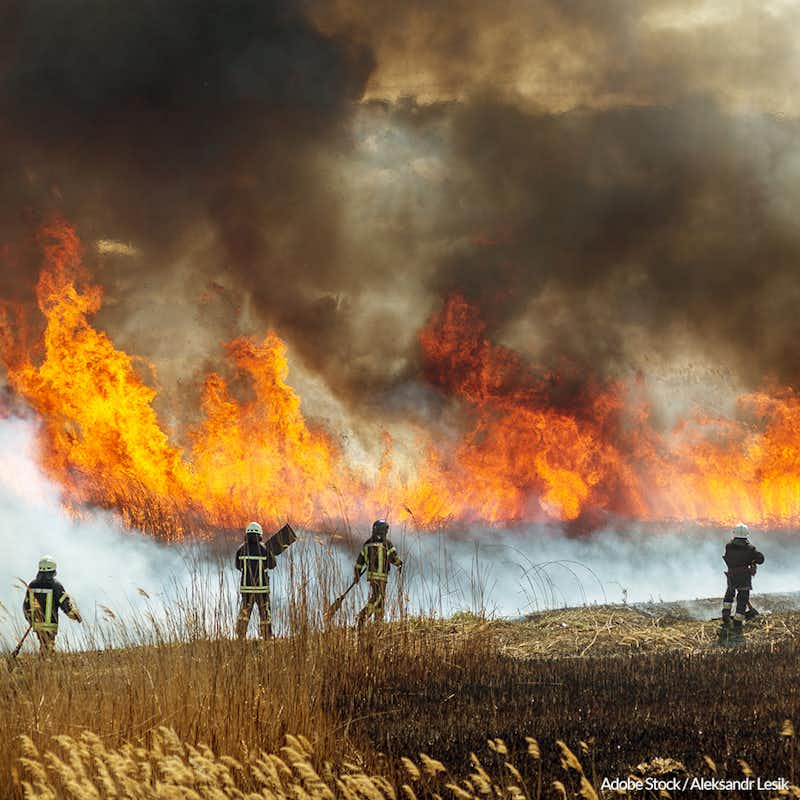Rebuild the US Forest Service and Prevent Mega-Fires
14,945 signatures toward our 50,000 Goal
Sponsor: The Rainforest Site
Demand the USDA give the US Forest Service the resources it needs to fight the massive wildfires in the western U.S.

The United States Forest Service is underfunded, short staffed, and unable to properly fight wildfires currently blazing in the western U.S.
Millions of acres of forest management projects have been put on the Forest Service backlog as the department lacks the funding and manpower to complete them1.
Wildfire suppression has taken up more than 50% of the USFS budget in recent years2. Just one or two of the catastrophic mega-fires like those we have seen in recent years burn through 30 percent or more of the Fire Service's yearly budget. The cost of fire suppression is predicted to increase to nearly $1.8 billion by 20253.
This work is more important than ever as climate change fuels larger and more destructive wildfires. Climate change has led to fire seasons that are now on average 78 days longer than in 19703.
And it's only getting worse.
The annual cost of fighting fires is regularly more than the amount budgeted to the USFS, forcing the department to transfer funds from already depleted accounts to pay for firefighting: a practice referred to as "fire transfer3."
Some of the projects that get downgraded are the same that could prevent or lessen the impacts of future wildfire. Congress typically provides supplemental resources to the USFS to make up for the transfers, but that safety net has become less dependable. President Trump recently denied the USFS $500 million in extra funding, which was then sent elsewhere1.
Prescribed fires help maintain and restore fire-adapted ecosystems, control some invasive species, and reduce hazardous fuels for potential mega-fires4. Prescribed fire returns the beneficial effects of fire to an ecosystem, producing native vegetation and fire-resilient landscapes4. It is also a relatively inexpensive method to reduce hazardous fuel loads and can be used to treat areas that are otherwise inaccessible.
Protecting public health and the environment benefits our economy by reducing long-term costs like health care, ecosystem restoration, and water treatment, while supporting job creation5. The cost of these programs together amount to a very small portion of the federal budget but will protect the lives of countless of Americans.
Help us protect the lives of millions of Americans and our environment from the growing threat of wildfire. Sign the petition below and demand that Congress fund and rebuild the US Fire Service to handle these much-needed prescribed fire projects.
- Anna M. Phillips, LA Times (21 Oct. 2020), "As wildfires explode in the West, Forest Service can't afford prevention efforts."
- United States Department of Agriculture, "The Rising Cost of Wildfire Operations, United States Department of Agriculture."
- Congressional Sportsmen's Foundation (18 March 2019), "Conservation Groups Support Funding for Forest Service Programs Following Fire-Borrowing Fix."
- Renee Magyar (20 April 2016), "The importance of fire."
- Natural Resources Defense Council, "Losing our Heritage: Budget Cut Impacts and Our Environment."
The Petition:
Dear Secretary of Agriculture Sonny Perdue,
The increasing occurrence of mega-fires in the western United States is a harsh wake-up call to the effects of climate change. Our warming climate has led to fire seasons that are now on average 78 days longer than in 1970, yet our US Fire Service remains underfunded, understaffed, and unable to fight these fires properly.
Wildfire suppression has taken up more than 50% of the USFS budget in recent years, forcing Congress to reallocate funds later in the season. Congress was recently sitting on $500 million that could have helped fight wildfires along the west coast, but the Trump administration sent these funds elsewhere.
This lack of funding forces the USFS to deprioritize prescribed fires, which otherwise help maintain and restore fire-adapted ecosystems, control some invasive species, and reduce hazardous fuels for potential mega-fires. Prescribed fires leave fire-resilient landscapes and reduce the risk of mega-fires erupting out of excessively dry conditions. These fires are also a relatively inexpensive method to reduce hazardous fuel loads and can be used to treat areas that are otherwise inaccessible or too expensive to reach with machinery.
I demand that you increase funding and staffing for USFS contracting and planning staff to support prescribed fires, and scale up work to restore ecosystems and historical fire patterns.
Sincerely,